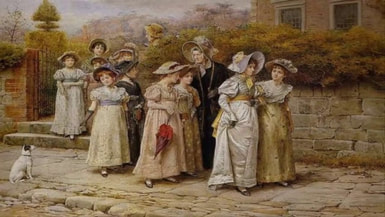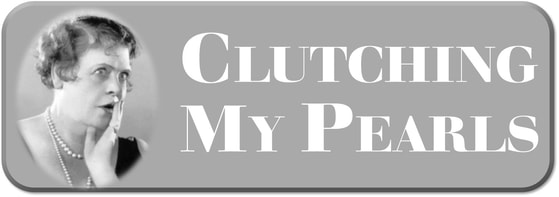| "Nature gave you understanding:—Miss Taylor gave you principles." -- Mr. Knightley to Emma Woodhouse in Emma |

In the previous posts, we've been looking at the theme of education, especially as it relates to Mansfield Park. In the conversation between the Bertram girls and their Aunt Norris, we see that Maria and Julia have been absorbing facts: “all the metals, semi-metals, planets, and distinguished philosophers,” but Austen informs us that the girls were “entirely deficient in the less common acquirements of self-knowledge, generosity and humility.”
Lady Bertram, their mother, pays no attention to their education.
In contrast, in Jane West's The Advantages of Education (1793), Mrs. Williams takes her daughter out of a fashionable boarding school and starts her on a course of guided reading. This section of the novel gives us an insight into how educated people of Austen's time and social class viewed themselves and their world: “History being most adapted to her purpose… The Grecian and Roman empires furnished various narratives, in which the force of patriotism, the firmness of virtue, and the astonishing greatness to which independence and integrity elevate the human mind, are exemplified. From the story of eastern nations, and the luxurious effeminacy that marked the declining days of Rome, [Mrs. Williams] endeavoured to inspire the attentive girl with an abhorrence of extravagance, corruption and licentious pleasures.
“In the annals of our own nation, she taught her to observe the gradual development of the mental powers, and to trace with nice discernment the varying manners of her countryman, from the rude Briton to the haughty Baron, and from thence to the elegant politeness of the present age…. Maria was led to admire the patience and courage of the untutored savage, the hospitality and spirit of the feudal tyrant, the mistaken piety and mortification of the Monk, and the steadfast firmness of our first reformers.”
Mrs. Williams' tutelage of her daughter helps her develop moral principles, which in turn help her resist the blandishments of a would-be seducer. (For more on this novel, click here). For rest of this article, click "Read More."

When the Miss Cambridges visit the Aubrey family in Aubrey (1804), they are favourably compared to the other young ladies in the neighbourhood because “they were not only well versed in the works of Pope, Thomson, Gray and Goldsmith…. [Milton’s] Paradise Lost… [and] Shakespeare… but... without the slightest degree of pedantry… [or] the slightest appearance of an affected display of a little learning.”
Mr. Aubrey opines that the best education consists of "Moral reasonings impressed upon the mind, an acquaintance with the appearances of nature, with the history of nations and distinguished persons, with the diversions, customs, and manners of the world, a turn for poetry, a knowledge of languages; even reading and writing well, [which] are surely infinitely more valuable than music and dancing...”
The virtuous Mrs. Welgrave in Celia in Search of a Husband (1809), laments that a faulty education might even lead to a girl reading the radical ideas of Mary Wollstonecraft: “When music, dancing, and French, are the whole of a child’s studies; when, to each of these, a considerable portion of the day is devoted; when not one moral obligation is enforced, or a divine truth illustrated, the creature grows into a woman, with no other idea than to attract—at sixteen she dances a pas seul, with habitual confidence—languishes an Italian air with a manner offensive to delicacy—and either closes her career by a blushless apathy to opinions, or casts the doubtful semblance aside, and stands confest a convert to the Rights of Woman.”
The ultimate aim of reading great literature and studying history and the natural world was to reflect upon one's studies and develop "moral reasonings" in an enlightened mind.
The little foundling Fanny in Fatherless Fanny gets her real moral education not from the headmistresses of her boarding school, but from a good-natured fellow-student: “All the pains bestowed upon Fanny’s education by Miss Bridewell and her assistants, would have availed little, had not the good precepts instilled into her heart by the amiable Emily Barlowe, given solidity to her principles. Piety is a natural feeling of the youthful heart, and only requires some skilful hand to call forth its latent energies, and give them their proper bias.”
We suspect that the governess to the Bertram girls, Miss Lee, might have been like Miss Bridewell, imparting facts without philosophy and accomplishments without personal insights. The results are clear in Maria and Julia Bertram, but Fanny had her cousin Edmund to supply the deficiency. Edmund's "attentions were otherwise of the highest importance in assisting the improvement of her mind... [he] made reading useful by talking to her of what she read, and heightened its attraction by judicious praise." Fanny keeps her own little collection of books In the East Room, including a book about the British embassage to China. We know she loves history, as she is disappointed that the chapel in Sotherton isn't more gothic and evocative of older days. We know she loves Cowper, the poet. We know from her effusions about evergreens and the unreliability of memory that she has been reading natural and moral philosophy.
 Public lecture, Thomas Rowlandson
Public lecture, Thomas Rowlandson Austenites know about Fordyce’s Sermons and other conduct books which also guided parents in the raising of their daughters. Mr. Collins offers to read Fordyce to the Bennet girls and is offended when Lydia is inattentive. We might suppose that Fordyce was all about urging young women to be docile and virtuous. No doubt he was, but you might be surprised to learn that according to scholar Deborah Weiss: “Fordyce urges young women to read history, biography, memoirs and travels, he encourages them to study astronomy and geography and to read natural and moral philosophy; and he permits them to read fables, visions, allegories, drama, poetry, and the best novels and romances.”
The Reverend James Fordyce would have approved of Fanny Price’s reading list. Even people whom we consider to be hopelessly patriarchal like Fordyce acknowledged the benefits when women developed their rational minds. However, Fordyce urged that “war, commerce, politics… abstract philosophy, and all the abstruser sciences are most properly the province of men." Weiss concludes that “Fordyce displays the conundrum of late eighteenth-century educators who want women to improve their minds, but who fear the possibility of an attendant loss of femininity.”
In Secrets Made Public (1808), Mrs. Fortescue, who actually fancies herself a philosopher, deplores women studying "abstruse subjects." “Do we not see chits, fresh from the boarding-school, who would be puzzled to tell you how many parts of speech there are, run over a long list of barbarous botanical terms, enough to strain the mouth of a North Hollander? Does not the Countess of Woodley profess a knowledge of chemistry, and pretend to write notes on the work of the Bishop of Llandaff?... And why is all this, but because it is the rage of the moment?”
This is also the view of Dr. Hoare and his friend Mr. Ogilvy in A Winter in London. When they take in a public lecture on Galvanism, they are dismayed to see a lot of fashionable women in attendance.
“But are not the scientific pursuits of the present day at least as beneficial to society as the old amusements of working carpets and chair bottoms?” said Doctor Hoare, playing devil's advocate.
“No, they are not.” [Ogilvy responds], “The end of such occupations was to render our homes, a word now almost obsolete, agreeable to their masters; whereas this mania of philosophy has a direct contrary tendency, converting our parlours into chemical laboratories, and our drawing-rooms into debating societies."
And alas, says the narrator, “So loud was the clamour of ladies’ tongues, that the poor lecturer’s learning and eloquence [on the subject of Galvanism] was totally wasted upon the greater part of the assembly.”

The hard sciences aside, many novelists agreed that a grounding in history and philosophy provided the foundations for firmness of mind which prepared girls for the vicissitudes of life.
In The Rotchfords (1786), a book for children, Mrs. Rotchford lectures her daughter Kitty that while “Men… ought undoubtedly to support whatever evil may befall them with resolution; but so, my dear child, should women also; and I should be very sorry, indeed, to suppose, that because I was a woman, I must for that reason have no fortitude or firmness of mind. Do not, I beseech you, my child, ever suppose that your sex will excuse you from giving way to weakness, impatience, and folly, for, if once you are possessed with this notion, you will begin to suppose it unnecessary to exert those faculties of the mind which are equally bestowed upon women, as well as men.”
She qualifies this with: “In some instances, indeed the qualifications of boys and girls, men and women, differ wildly, and what in the one sex is absolutely requisite, in the other would appear most ridiculous and disgusting. For instance, there certainly was no impropriety in Charles’s riding on the top of the hay-cart yesterday, and taking off his coat and waistcoat whilst he was assisting in loading it. But would it not have appeared most dreadfully indelicate, if you or your sisters had employed yourselves in the same manner, and pulled off your frocks and stays?”
In Fatherless Fanny, the author opines: “But barren is that mind, whose improvement has been confined to the study of mere ornamental acquirements; the musician, the dancer, or the paintress, however skillful in the various branches, will make but a poor wife, if she be deficient in the more solid and valuable qualities of good sense, good temper, and above all, religion and virtue. The knowledge of languages, though carried to the highest pitch of perfection, can suggest no comfort for affliction, nor strengthen the suffering mind to bear…. (etc., etc., fortitude and resignation, etc.)….”
In Emma, Mr. Knightley thinks Emma's governess Miss Taylor should have been stricter with Emma, in terms of insisting on a "course of steady reading." But he does acknowledge to Emma that "Miss Taylor gave you principles."
When Louisa Musgrove falls off the Cobb in Persuasion, her sister and sister-in-law go into hysterics. Only Anne Elliot keeps her head. It is brought home to Captain Wentworth that character makes a difference: "[T]he scenes on the Cobb and at Captain Harville's had fixed her superiority."
Fanny Price shows strength of character when she refuses to marry a man she does not love or respect. Edmund commends Fanny for being "a woman who, firm as a rock in her own principles, has a gentleness of character so well adapted to recommend them." How does she measure up to the conduct-book ideal? Scholars such as Kenneth L. Molar and Jane Nardin argue that Mansfield Park “makes extensive use of the ideas developed in [Hannah More’s] best-selling manual of advice to parents, Strictures on the Modern System of Female Education, published in 1799.” Was Jane Austen creating a conduct-book miss for a heroine? It looks that way to me, and I'll develop that thought in future posts.
Previous post: What Austen said about the West Indies Next post: The Right of a Lively Mind
| Weiss, Deborah. The Female Philosopher and Her Afterlives. Springer International Publishing AG, 2017. Speaking of "a course of steady reading," I have just discovered a blog by that name which features an exploration of 18th-century literature much as I am doing. Delightful reading. This post is part of an ongoing series about Mansfield Park and the theme of education in Austen's time. For the first post in the series, click here. For my series about Mansfield Park and the theme of slavery, click here. |

 RSS Feed
RSS Feed